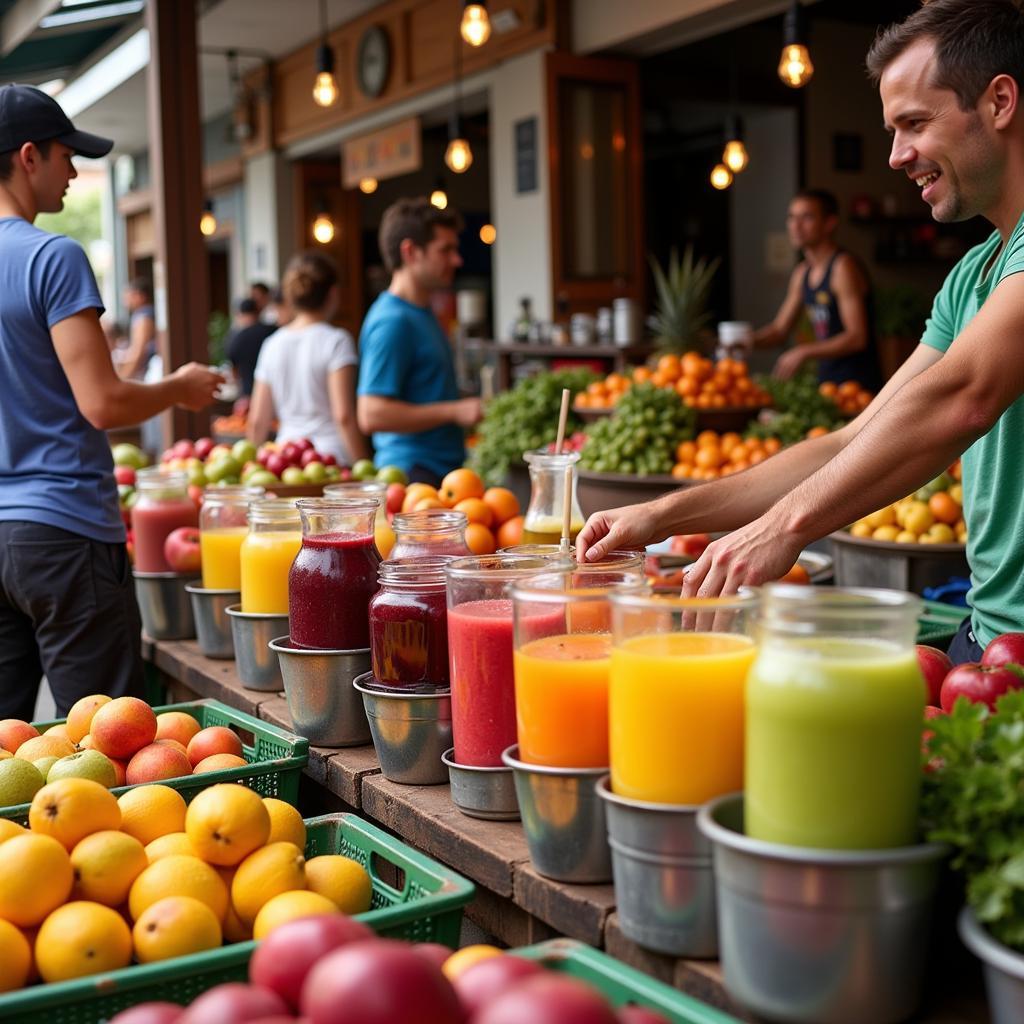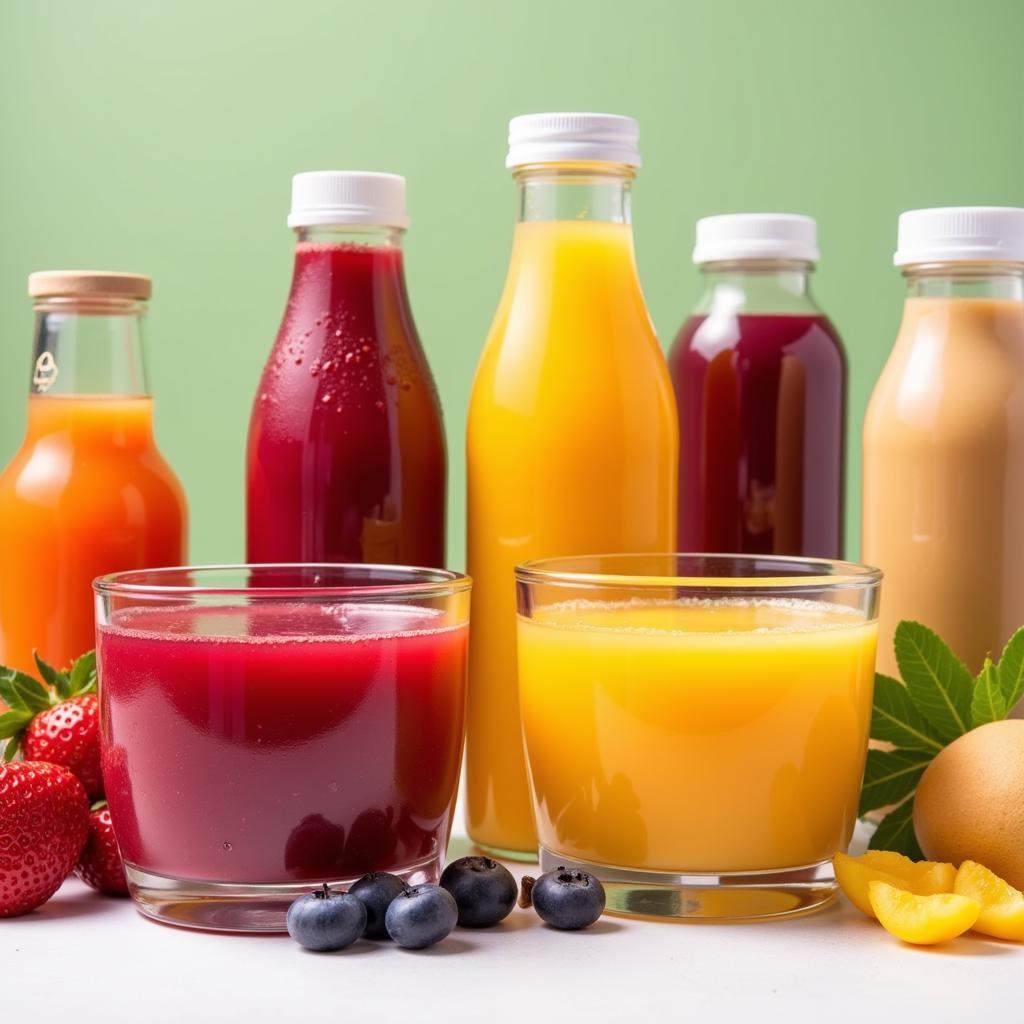A Celebration of African Juice: From Baobab to Bissap
African Juice is a vibrant tapestry of flavors, colors, and aromas, reflecting the continent’s diverse cultures and abundant natural resources. From the tangy sweetness of baobab to the refreshing zest of bissap, these beverages offer a delightful journey for the palate and a glimpse into the heart of Africa’s culinary traditions.
Unveiling the Diversity of African Juices
Unlike mass-produced fruit juices, traditional African juices are often made with a variety of ingredients, going beyond the typical fruits found in supermarkets. These drinks often incorporate indigenous fruits, leaves, flowers, and spices, creating unique flavor profiles that are both delicious and culturally significant.
 African Juice Vendors
African Juice Vendors
More Than Just a Drink: The Cultural Significance
African juices are deeply intertwined with the continent’s social fabric. They are often shared at gatherings, ceremonies, and celebrations, symbolizing hospitality and community. For example, bissap, a vibrant hibiscus-based drink, is a popular choice for welcoming guests in many West African countries.
 Family Enjoying African Juice
Family Enjoying African Juice
Health Benefits: A Bounty from Nature
Beyond their delicious taste, many African juices are packed with nutrients and offer various health benefits. Baobab fruit pulp, for instance, is rich in vitamin C, antioxidants, and fiber, while the African cherry orange, known as “omuboro” in Uganda, is a good source of vitamins A and C.
What are the health benefits of some popular African juices?
- Baobab Juice: High in vitamin C, antioxidants, and fiber. May aid digestion and boost the immune system.
- Hibiscus Tea (Bissap): Rich in antioxidants and may help lower blood pressure.
- Ginger Juice: Known for its anti-inflammatory properties and its ability to aid digestion.
Exploring Popular African Juices
From north to south, east to west, Africa boasts a dazzling array of fruit juices. Here are a few notable examples:
- Baobab Juice: Made from the fruit of the majestic baobab tree, this juice has a tangy, slightly sweet flavor reminiscent of citrus and pear.
- Bissap (Hibiscus Tea): This vibrantly colored drink offers a tart, refreshing taste and is often flavored with mint or ginger.
- Ginger Drink (Tangawizi): A spicy and invigorating juice made from fresh ginger root, often sweetened with honey or sugar.
- Palm Wine: A naturally fermented drink made from the sap of palm trees, popular in West and Central Africa.
 Variety of African Juices
Variety of African Juices
Making African Juice at Home
Many traditional African juices can be recreated at home, bringing the flavors of the continent to your kitchen. Ingredients like baobab powder and dried hibiscus flowers can be found online or at specialty stores.
Can you share a simple recipe for Bissap?
Ingredients:
- 1 cup dried hibiscus flowers
- 4 cups water
- Sugar to taste
- Optional: Orange slices, mint leaves, or ginger for added flavor
Instructions:
- Rinse the hibiscus flowers in cold water.
- Combine the flowers and water in a saucepan and bring to a boil.
- Reduce heat and simmer for 15 minutes.
- Strain the mixture through a fine-mesh sieve.
- Add sugar to taste.
- Serve chilled or over ice.
Conclusion: Savoring the Essence of Africa
African juices offer a unique and delicious way to experience the continent’s rich cultural heritage and natural bounty. Whether enjoyed at a bustling market, a family gathering, or prepared in your own home, these drinks are sure to tantalize your taste buds and leave you wanting more. So next time you’re looking for a healthy and refreshing drink, consider exploring the world of African juice.
FAQs About African Juice
1. Where can I buy African juice ingredients?
Many ingredients, such as baobab powder and dried hibiscus flowers, can be found online or at specialty food stores.
2. Are African juices healthy?
Many African juices are naturally rich in vitamins, antioxidants, and other nutrients. However, it’s important to note that some recipes may include added sugar.
3. Can I make African juice at home?
Yes, many traditional recipes are easy to recreate at home.
4. What is the best way to serve African juice?
African juice is best served chilled or over ice.
5. What are some popular occasions to serve African juice?
These drinks are often shared at gatherings, ceremonies, and celebrations.
Looking for More?
- Learn about the African cherry orange and its many culinary uses.
- Discover delicious African catfish recipes that pair perfectly with a refreshing juice.
Need assistance? Contact us: Phone: +255768904061, Email: kaka.mag@gmail.com or visit us at: Mbarali DC Mawindi, Kangaga, Tanzania. Our customer service is available 24/7.


